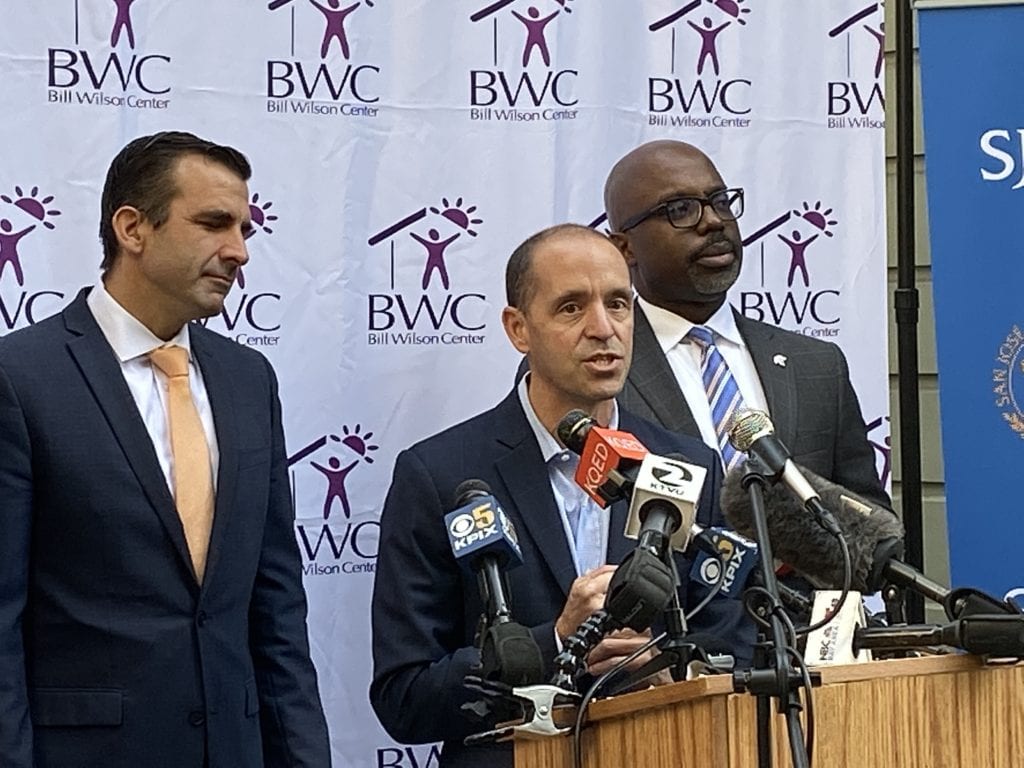Two years after launching a landmark program to house homeless San Jose students in Airbnb rooms, nearly half the participants dropped out of the program and ended up in hotels.
The program, officials say, took major blows from COVID-19 and other logistical problems.
Sparky Harlan, CEO of the Bill Wilson Center that helped run the program, said the model ran into snags because of the pandemic. Like many local markets, the number of Airbnb listings dropped dramatically in the early days of the pandemic just as the program was getting off the ground. At the same time, hotel rates plummeted, making them cheaper than Airbnb stays, where the center turned some of its attention and resources during the pandemic. Three Airbnb employees previously worked with the center on this project, but because of the pandemic they were either reassigned or no longer work at the company.
“We had high hopes for the model, but as we got into it, it was a mixed bag,” Harlan told San José Spotlight. “What ended up being cumbersome for us was if someone was in there for two or three weeks and we found them a place to live permanently, then we had to reconcile those extra two or three weeks we paid for. That’s where the model becomes more difficult to work with.”
Harlan estimates about 50-60% of the program’s operations switched from Airbnb to looking at hotels due to the change in price.
In late 2019, San Jose Mayor Sam Liccardo stood shoulder to shoulder with Airbnb executives and announced a novel solution to the city’s growing student homelessness crisis: Bunking in Airbnb rentals through a partnership with the company and Bill Wilson Center. The innovative public-private partnership was lauded as one of the first of its kind.


But the COVID-19 pandemic raised new challenges with the already complicated idea.
Putting students in shared Airbnb homes became challenging because of social distancing rules. But there were other problems with the model: Some students ended up finding housing in less than a week, leaving already-booked Airbnbs empty for weeks or more.
A growing problem
San Jose State University, one of the city’s proudest downtown landmarks, is home to one of the largest homeless student populations in the state.
A 2018 study found SJSU had one of the highest rates of homeless students in the CSU system—13.2%, or about 4,000 students. The CSU study found Black and first-generation students experience the highest levels of food insecurity and homelessness. More than 50,000 students in the CSU system—about 11%—have experienced homelessness, the report said.
According to a recent basic needs survey, 41.5 % of SJSU student respondents dealt with housing insecurity in the past year, with 11.2% homeless for at least a day. And nearly 30% of the student population faces food insecurity.
A 2019 San José Spotlight report revealed that out of 200 students who asked the university for housing, just six received help. Student activists for years have called on university administrators to address the crisis—demanding safe parking spaces for students living in their cars, emergency beds on campus and grants to help with rising rent costs.
They won a small victory this month when university leaders announced setting aside 12 beds on campus for homeless students —for just one semester.
It’s a growing problem, a university spokesperson says, and there are no easy answers.
“SJSU has implemented several new resources to help housing insecure and homeless students,” Robin McElhatton, spokesperson for the university, told San José Spotlight. “One significant enhancement was the creation of the Rapid Rehousing Partnership with the Bill Wilson Center with the goal of providing comprehensive support to 45 students experiencing housing insecurity.”
‘Things change’
The Bill Wilson Center received a $250,000 state grant to support its work housing homeless students, including the Airbnb program. Some of it went to mental health resources and other housing programs for college students.
The Airbnb collaboration was part of a larger goal to house 100 students in 100 days, which ended last year. The center managed to house 134 students from local community colleges—including Evergreen College and San Jose City College. The center identified students in need, found them hosts using Airbnb, booked those homes on the students’ behalf and paid the bills. Stays ranged anywhere from a few days to months, with an average stay of 30 days. It also provided some students with case management services.
The work with Airbnb is still ongoing, Harlan said, though at a smaller scale than anticipated due to the pandemic.
“It ended up being a different dynamic on how the program worked,” Harlan said. “Just like everything COVID. Things change.”
Contact Lloyd Alaban at [email protected] or follow @lloydalaban on Twitter.



Leave a Reply
You must be logged in to post a comment.